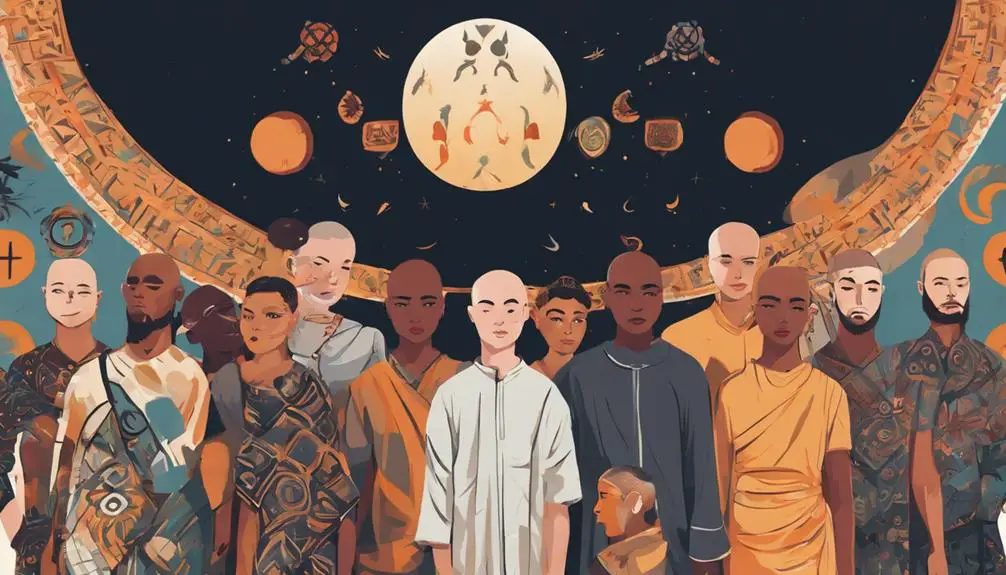Journey through the beliefs of various religions to uncover if shaving your head is considered a sin, revealing deep cultural and spiritual insights.

Is It a Sin to Shave Your Head?
Navigating the topic of head shaving is like walking through a maze of diverse religious and cultural beliefs. You might think it's a straightforward decision, but various faiths, including Christianity, Islam, Buddhism, and Sikhism, offer a rich tapestry of perspectives on whether shaving your head could be considered a sin.
Each tradition brings its own set of reasons, ranging from spiritual symbolism to rites of purification. As you ponder this question, remember that your journey isn't just about uncovering if it's a sin; it's also about understanding the deep spiritual and cultural significance hair holds across the world.
Let's explore what lies beneath the surface.
Key Takeaways
- Shaving the head is not universally considered a sin; it varies by religious and cultural context.
- In Islam, head shaving during Hajj is a sign of purification, not a sin.
- Buddhist practices view head shaving as a symbol of renunciation and mindfulness, not sinful.
- Sikhism values hair (Kesh) as a symbol of devotion, implying shaving could be spiritually significant, not sinful.
Biblical Perspectives on Hair

Often, the Bible addresses the topic of hair, offering insights that reflect its cultural, spiritual, and symbolic significance in various contexts. Hair symbolism, deeply rooted in biblical narratives, conveys messages of strength, devotion, and identity.
The Nazirite vow, for instance, illustrates the profound connection between hair and spiritual commitments. When you take a Nazirite vow, as described in the Book of Numbers, you're making a promise to abstain from wine, avoid contact with the dead, and crucially, not to cut your hair during the vow's period. This unshorn hair serves as a public testament to your dedication to God, symbolizing a separation from ordinary life for spiritual reasons.
This emphasis on hair demonstrates its role not just as a personal attribute but as a conduit for deeper spiritual messages. The act of not cutting one's hair under the Nazirite vow underscores a surrender of personal vanity in favor of divine service. It's a vivid illustration of the weight hair carries as a symbol in biblical texts, where it's not merely part of one's appearance but a manifestation of inner vows and spiritual states.
Islamic Views on Head Shaving
In Islamic tradition, shaving one's head carries significant religious connotations, particularly during the Hajj pilgrimage, where it symbolizes purification and renewal. This practice is deeply embedded in the rituals that define the spiritual journey to Mecca.
While the act of shaving the head during Hajj is highly symbolic, Islam also provides guidance on head shaving outside of these rituals, taking into account both the intentions and the circumstances surrounding the act.
Here are key points to consider:
- Hajj rituals: Shaving the head is a profound act of worship and submission to Allah, performed by male pilgrims during the Hajj. It signifies the completion of their pilgrimage and their renewed state of spiritual purity.
- Medical reasons: Islam permits shaving the head for medical purposes, acknowledging the importance of preserving one's health and well-being.
- Intention matters: The underlying intention, or niyyah, is crucial. Shaving one's head out of vanity or to imitate those who oppose Islamic values is discouraged.
- Gender considerations: While men are encouraged to shave their heads during Hajj, women are instructed to trim a small portion of their hair, reflecting modesty and privacy.
- Cultural respect: Though practices may vary across different cultures within the Islamic world, the core spiritual significance remains consistent and revered.
Understanding these aspects can help you appreciate the depth and respect Islamic tradition holds for personal grooming choices, especially those as significant as shaving one's head.
Buddhist Practices and Hair

Just as Islamic tradition holds specific views on head shaving, Buddhist practices also place a distinct emphasis on hair, symbolizing renunciation and detachment from worldly concerns. In Buddhism, shaving your head can be a profound expression of monastic ordination, marking a pivotal transition into a life dedicated to spiritual growth and aesthetic detachment. This act is not merely about altering one's appearance but signifies a deep commitment to shedding the ego and attachments that bind one to the cycle of suffering.
Aspect |
Significance |
|---|---|
Monastic Ordination |
Shaving the head marks the entry into monastic life, symbolizing a clean break from the layperson's life and a commitment to living by the monastic code. |
Aesthetic Detachment |
Hair is often associated with vanity and social status. Removing it serves as a physical manifestation of a monk or nun's effort to overcome superficial attachments and focus on inner development. |
| Symbol of Renunciation | The act of head shaving is a visible sign of renouncing worldly desires and the commitment to a path of simplicity and mindfulness.
Understanding these practices allows one to appreciate the depth and significance of hair in Buddhist tradition, highlighting how physical actions can reflect profound spiritual commitments.
Hair in Sikhism: A Sacred Symbol
Respect for hair holds a profound place within Sikhism, symbolizing a person's devotion and commitment to their faith. In this tradition, hair, or *Kesh*, isn't merely a physical attribute but a sacred symbol of Sikh identity. Adhering to the practice of keeping hair uncut expresses a deep respect for the natural gifts bestowed by the Creator and illustrates a follower's dedication to the teachings of Sikhism.
- Unaltered State: Sikhs maintain their hair in its natural, unaltered state as a sign of respect for God's creation, reflecting a holistic acceptance of one's natural self.
- Kesh Adherence: This practice is one of the Five Ks, a set of symbolic articles of faith that devout Sikhs are expected to adopt, underscoring the importance of Kesh in Sikh identity.
- Spiritual Significance: Beyond physical appearance, Kesh represents a spiritual journey and a constant reminder of a Sikh's obligations and identity.
- Historical Roots: The tradition has deep historical roots, linking individuals to the founders of the faith who emphasized the importance of Kesh in maintaining Sikh identity.
- Community Bonding: Adhering to this practice fosters a sense of community and belonging among Sikhs, uniting them in their shared respect for tradition and faith.
In essence, Kesh adherence in Sikhism transcends mere tradition, embodying the spiritual aspirations and identity of its followers.
Cultural and Personal Considerations

Exploring the decision to shave one's head involves examining both the cultural implications and personal motivations that influence this choice. You're navigating a landscape where aesthetic choices intersect with deeper, often personal, values. In some cultures, a shaved head symbolizes renunciation, mourning, or a rite of passage. It's a visible marker of one's identity and beliefs, tethered to tradition and community norms. Yet, beyond cultural dictates, individual reasons play a pivotal role.
You might opt to shave your head for health reasons, perhaps to preempt the visual effects of medical treatments or to manage conditions affecting scalp health. Similarly, the choice could stem from a desire for simplicity, freeing oneself from the daily maintenance hair requires. It's crucial to acknowledge that these decisions are deeply personal, reflecting one's journey towards self-definition and comfort in their skin.
In dissecting the motivations behind shaving one's head, it's apparent that the act transcends mere aesthetic choices. Whether driven by cultural expectations or personal health reasons, it's a decision imbued with significance, deserving of respect and understanding.
Frequently Asked Questions
How Does Head Shaving Affect Mental Health and Self-Perception?
Shaving your head can significantly boost your self-confidence and offer a unique opportunity for identity exploration. It encourages self-reflection and may positively impact your mental health by affirming your sense of self and autonomy.
Can Shaving Your Head Lead to Any Significant Changes in Hair Texture or Growth Patterns Over Time?
Shaving your head won't permanently alter your hair texture or growth patterns. This belief is a hair myth, as scalp health mainly dictates these factors. Regular shaving impacts neither, maintaining your natural hair characteristics.
Are There Any Environmental Impacts Associated With Frequent Head Shaving?
Frequent head shaving has environmental impacts, particularly concerning razor sustainability and water usage. You'll find that disposable razors contribute to plastic waste, and the water needed for shaving can significantly increase your overall consumption.
How Do Professional Environments and Corporate Cultures Generally View Head Shaving in Terms of Personal Appearance and Professionalism?
In professional environments, head shaving's perception often hinges on gender stereotypes and dress code flexibility. You'll find that while some companies embrace it as a form of personal expression, others may view it skeptically.
What Are the Historical Origins of Head Shaving in Military Contexts, and How Has Its Significance Evolved?
Historically, head shaving in military contexts originated from religious rituals and efforts to shape social identity. Its significance has evolved, reflecting discipline and unity among soldiers, while also marking a rite of passage.
Conclusion
In conclusion, the spiritual and cultural views on shaving your head vary significantly across different beliefs and societies. From the Biblical teachings that don't explicitly forbid it to Islamic rituals that embrace it, and from Buddhist renunciation practices to the Sikh valorization of hair, each perspective offers a unique lens on the significance of hair.
It's crucial to understand and respect these diverse viewpoints, recognizing that personal and cultural choices about hair are deeply rooted in broader spiritual and societal contexts.



Sign up